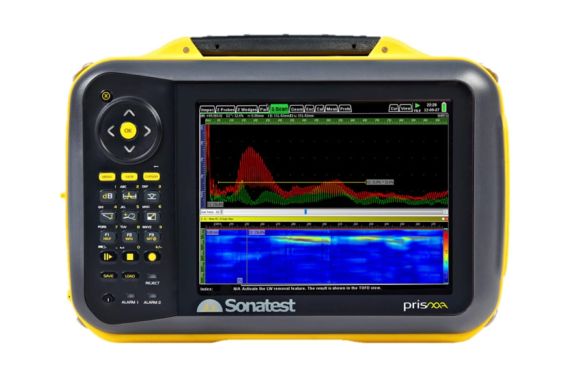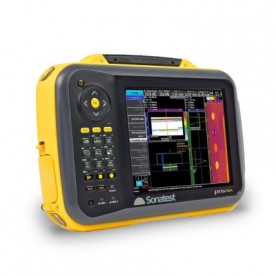- Home
- About Us
- Products
- Rohmann Eddy Current
- Secu-Chek UV-LED Lamps
- Sonatest
- MR Chemie
- NOVO DR
- Hoffmann Tam Panels
- Desoutter Industrial Tools
- Novotest
- Integrated Design Tools (IDT Vision)
- Dakota NDT
- DeFelsko Corporation
- AVIONICS
- Sonotec Ultrasonic Solutions
- Sonotec Ultrasonic Hand-Tools
- G.A.L. Gage Company
- Western Instruments Inc.
- Esders Gas Technology
- Yoancomposite
- Hinode Electric
- Services
- News
- Contact Us
 (65) 6878 0608  (65) 6878 0609 |
Overview
The prisma ultrasonic flaw detector offers the end user, outstanding performance in the field together with the flexibility and capability to step up from using a high-end ultrasonic flaw detector to an instrument with phased array functionality.
Features
1) As simple as you want
- 30 second configuration
- No Delay – UT to PA – one button away
- Configuration and Calibration Wizards
- “Parameter Genius” giving you step by step assurance
- Minimise training due to the common user interface
- UT Studio+ provides fast & dynamic reporting
2) As capable as you need
- UT, TOFD & PA Inspection Modes
- Multi-mode validation of inspection
- Upgradeable anytime, anywhere!
- Unique cursors for precision measurement
- Recordability: screen shots, full data recording, fully traceable.
- Customisable imaging layout – 29 to choose from.

Specification
| Conventional UT | Phased Array | |
|---|---|---|
| Pulsers | ||
| Configuration | 2 UT Channels | 16:16 or 16:64 |
| Test Mode | Pulse-Echo, Transmit/Receive and TOFD | Pulse-Echo, Transmit/Receive |
| Transducer Socket | LEMO 1 or BNC | I-PEX |
| Pulse Voltage | -100V to -450V (in steps of 10V) | -25V to -75V (in steps of 5 V) |
| PRF | 1Hz to 1500Hz | 1Hz to 5000Hz |
| Pulse Shape | Negative Square Wave (with ActiveEdge) | Negative Square Wave (with ActiveEdge) |
| Pulse Width | Adjustable: Spike to 2000ns (2.5ns resolution) | Adjustable: Spike to 1000ns (2.5ns resolution) |
| Edge Time | 15ns in 50Ω load @200V | 12ns in 50Ω load @50V |
| Output Impedance | 5Ω | <10Ω |
| Trigger Synchronisation | On encoder resolution or internal PRF (both encoded or not) | On encoder resolution or internal PRF (not encoded) |
| Focus Delay Range | n/a | 0 to 10μs (2.5ns resolution) |
| Damping Resistor | Selectable: 50Ω or 400Ω | n/a |
| Receivers | ||
| Gain Range | 100dB (0.1dB steps) Analogue Gain | 0 to 76 dB (0.1 dB steps), Analogue Gain |
| Max Input Voltage | 25Vp-p | 200mVp-p |
| Input Impedance | 1kΩ (pitch and catch) | 200Ω |
| Bandwidth | 200kHz to 22MHz (-3dB) | 200kHz to 14MHz |
| Analog Filters | 4 (automatic or manual) | 3 (automatic) |
| Digital Filters | 10 (automatic or manual) | 10 (automatic or manual) |
| Rectification | Full wave, positive, negative, none (RF) | Full wave, positive, negative, none (RF) |
| Signal Enhancement | Digital filters, Smoothing, Contouring, Rejection, Averaging | Digital filters, Smoothing, Contouring, Rejection |
| Focus Delay Range | n/a | 0 to 10μs (16ns resolution interpolated to 3.8ns) |
| Data Acquisition | ||
| Architecture | 2 channels, true 200MHz sampling rate | 16 Channels, Full digital Delay & Sum |
| Digitizer Resolution | 12bit ADC | 12bit ADC |
| Amplitude Measurement | [0% to 100%] or [0% to 150%] FSH | [0% to 100%] or [0% to 150%] FSH |
| Data Processing | 16bits/sample | 16bits/sample |
| Data Recording | Full raw data recording (plus sub-sampling options) | Full raw data recording (plus sub-sampling options) |
| File Size | up to 3GB | up to 3GB |
| Digitizing Frequency | 50MHz, 100MHz, 200MHz | 65MHz |
| Focal Laws | n/a | 128 |
| Focusing Mode | n/a | Natural or constant depth/path/offset |
| Max A-Scan Length | 8192 samples | 4096 samples |
| Sub-Sampling | 1:1 to 1:128 | 1:1 to 1:128 |
| Reference | Initial Pulse or Gate/IFT supported | Initial Pulse or Gate/IFT supported |
| Trigger Sync. | Encoder or Internal | Encoder or Internal |
| Scan & Views | ||
| Supported Scans | A-Scan & TOFD | S-Scan or L-Scan |
| Number of Scans | up to 2 | 1 (with up to 3 extracted A-Scans) |
| Views | A, B, C-Scan, Merged & TOFD | A, B, C, L, S-Scan, Merged plus true TOP & END |
| Colour Maps | up to 10 | up to 10 |
| Number of Layouts | 18 | 35 |
| Cursors | ||
| Cursor Types | Cartesian, Hyperbolic (TOFD) | Cartesian, Extraction Box, Angular |
| Measurements | Path Length, Depth, Surface Distance, DAC, AWS, DGS | Path Length, Depth, Surface Distance, DAC, AWS |
| DAC & TCG | ||
| DAC points | 16 | 16 |
| DAC | 1 with 3 “sub DACs” | 1 with 3 “sub DACs” per focal Law |
| TCG points | 16 | 16 |
| Gain Range | 60dB | 40dB |
| Max Gain Slope | 60dB/μs | 50dB/μs |
| Gates | ||
| A-Scan Gates | 4 gates per A-Scan | 4 gates per A-Scan (3 extracted A-Scans per S/L-Scan) |
| Gate Trigger | Flank/Peak | Flank/Peak |
| S/L-Scan | n/a | 1 Extraction Box |
| Alarm LED | 2 (sync on all gates & DACs) | 2 (sync on all gates & DACs) |
| Measurements (A-Scan) | Peak & Flank (FSH, dB, Depth, Beam Path Length, Surface Distance), Echo-to-Echo, Floating Gates (reference from IFT) | Peak & Flank (FSH, dB, Depth, Beam Path Length, Surface Distance), Echo-to-Echo, Floating Gates (reference from IFT) |
| Interface & Reporting | ||
| Integrated Help | Active help & parameter description / Optimisation | |
| Remote Connection | Onboard VNC Server and FTP Server (connection through Ethernet protocol) | |
| Wizards | Configuration, Velocity and Zero, Wedge Delay, Sensitivity, TCG, DAC, DGS, Element Activation, Encoder | |
| Languages (dynamic) | Selectable: English, German, French, Spanish, Russian, Chinese, Hungarian, Italian, Portuguese | |
| Report Generation | PDF Report (includes customer logo, scan acoustic parameters, measurements, etc.), PNG screen capture. | |
| PDF Reader | Allows viewing any uploaded PDF file, scan plan, procedures, old reports etc. | |
| Inputs & Outputs | ||
| Encoder | 1 or 2 axis encoding (quadrature input) | |
| Digital Inputs | 2 input lines (5V TTL) | |
| Digital Outputs | 4 Output lines (5V TTL, 20mA) for alarm or other external control | |
| Power Output | 5V, 350mA, current limited | |
| Enclosure | ||
| Dimensions (HxWxD) | 205mm x 300mm x 90mm | |
| Weight | 3.5 kg (with battery) | |
| Display Size | 8.4inch (diagonal) | |
| Display Resolution | 800 x 600 | |
| Display Colours | 260k (65535 colours for scan palettes) | |
| Display Type | TFT LCD, 450Cd/m2, with 2% reflectivity | |
| USB ports | 3 USB Master ports | |
| Ethernet | 100Mbps | |
| Battery & Power Supply | ||
| Battery Type | Intelligent Li-ion | |
| Number of batteries | 1 | |
| Operation | On battery or on External power (DC Power Pack) | |
| Battery Replacement | Yes, no tools required | |
| Battery Recharge | Recharge in unit (with unit On or OFF) – External Battery Charger (std) (as per EN16392) | |
| Battery Life | Typical: 7 hours in UT mode, 6 hours in PA mode | |
| Environmental | ||
| IP Rating | Designed to meet IP66 | |
| Operating Temperature | -10oC to 45oC (14oF to 113oF) | |
| Storage Temperature | -25oC to 60oC (-13oF to 140oF) | |




